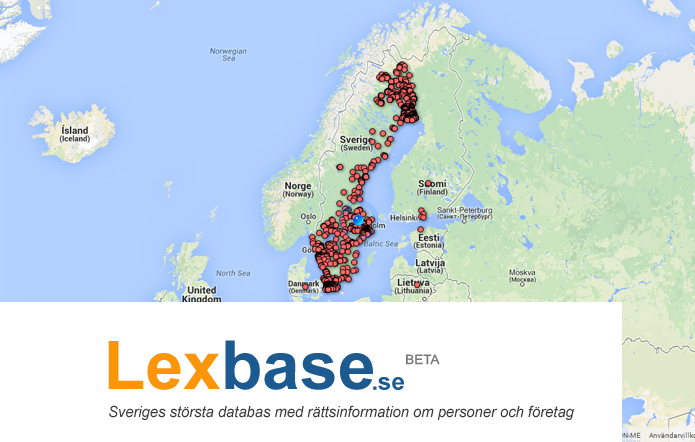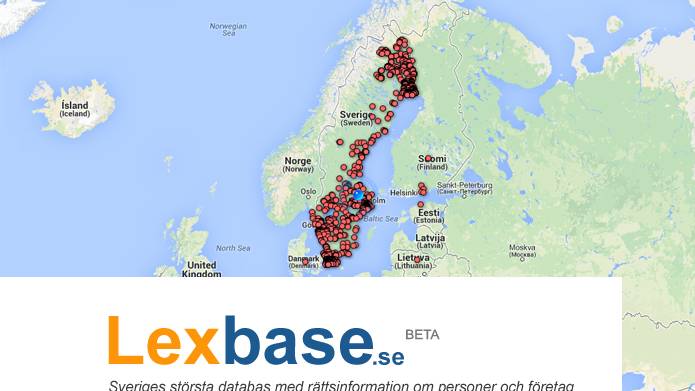Lexbase - Site lets Swedes snoop on friends’ criminal past
Comment: This article from the local shows the latest example of a long string of registers and measures that have been taken in Sweden to erode all forms of privacy and individuality. There is no privacy in Sweden. Period.It’s a stalkers paradise. First you have the prospect that several "yellow pages" type websites post your full name, birth date and residential address on their websites. You have to write to them to request them to take it off and continue to hide it. Utility companies and phone companies also regularly submit your information to these sites so you have to continue to keep your records off these websites and/or request directly to those who are in a position to share your address to not share it with any third party. I’ve seen several people (women specifically) who has expressed tremendous fear once they were being stalked and realized that all their details were available on 6 or 7 websites (at least). It turns out that it takes a number of phone calls and a number of days waiting to get your details off, from these websites. Great, right?
There is also a fully accessible car registration number registry where you can find people’s name and full address based on their cars registration number alone, another stalkers dream.
Did you know that in Sweden people’s tax returns have been public since 1903. Copies of the Taxation Calendar, which lists the earnings of those with middle to high incomes, are printed and made available to anybody. Do you want to "spy" on what your neighbor makes? This means that quite regularly the Swedish "newspapers" you’ll have full listings of "who makes the most in your community/town".
Yep that’s right! Great for people who are both stalkers and robbers, so they know where to go. I guess it’s the governments way of helping to "equal the playing field." So that if (read: when) Robbin Hood shows up, he’ll know what house he should go to.
Sweden is a model society and the sheep are used to it. They have no clue. If this was done in America (where people have known what is known as individuality and privacy) or in most other countries, there would be an outrage. All I hear is silence .
The paradise of Jantelagen is coming to a country near you, soon.
This latest website, Lexbase is just an extension in this already completely dehumanizing process of no privacy, and stalker encouragement mentality.
Enjoy your servitude, and don’t forget to inform yourself of this:

Site lets Swedes snoop on friends’ criminal past
From: thelocal.se

A new Swedish website that lets people check out their neighbours’ criminal records has privacy experts up in arms, warning the site could breach the country’s privacy and slander laws.
The new Lexbase.se service allows people in Sweden to look up a friend’s, colleague’s or neighbour’s criminal record, and to get an overview of their neighbourhood, with red dots signaling the presence of convicted criminals on a map.
The service has defended its new product as an extension of Sweden’s right to public information law, but critics said on Monday that it may breach not only privacy laws, but also legislation on slander.
"I think the business idea is dead in the water," law professor Mårten Schultz told the TT news agency. "It sounds like it contravenes the personal information law and will be taken down."
Lexbase.se spokesman, lawyer Pontus Ljunggren, said the service was in line with the times and suits Swedes’ desire for information. He argued that the website could help women on the dating scene, as they might want to know if their prospective date had any previous convicts for rape or assault.
"The underlying idea with the right to information act (Offentlighetsprincipen) is that transparency is a good thing. We are just making it more modern," he told TT.
Ljunggren added that the company could not take responsibility for how information on site was used.
"It can, just like anything else, be abused. But we can’t take responsibility for what people do. They can get the same information from their local district court," Ljungman said.
On Monday, the site was temporarily offline due to a flood of traffic.
Lawyer Johan Åberg, who specializes in libel and slander cases, said how people use the information from Lexbase was relevant.
"If my neighbour has five convictions and I download the verdicts and then canvas the neighbourhood to tell people, I could be guilty of slander," Åberg told TT.
The issues of privacy and right to information are not new in Sweden. In 2009, authorities moved to close down a website where parents swapped information about convicted rapists and sex offenders, in particular crimes involving minors.
"We consider the publication to be a serious breach of privacy laws. That is why we are now reporting the site to the police," said Data Inspection Board (Datainspektionen) head Göran Gräslund said at the time.
Legal experts have outlined fear that the spread of such information could spark vigilante or mob justice.
"In a democracy it is of great interest that the state retains a monopoly on the administration of justice and that there is not some form of private punishment," said retired state prosecutor Sven-Erik Alheim to Crime News.
Schultz, meanwhile, said that services such as Lexbase illustrated the ease of spreading information.
"There have been discussions all the way up to the European level about the fact that the internet makes it so cheap to store this kind of data," he told TT. "The right to information law was not meant to work this way."
Source: thelocal.se
Swedish Lexbase official quits as controversy rages
From: thelocal.se
Lexbase, a site allowing Swedes can look up neighbour’s criminal records, was embroiled in further controversy on Tuesday as its owner was revealed to have criminal connections and its spokesperson quit after reportedly receiving death threats.
Lexbase legal spokesman and five-percent stakeholder Pontus Ljunggren had been the public face of the yellow pages of Swedish criminal records since its launch on Monday. But on Tuesday afternoon, he announced he would no longer represent the company, which has raised concerns among privacy advocates and lawyers groups.
"Pontus Ljunggren has resigned as he and his family have received death threats," the company said in a statement on Tuesday.
The resignation was the second blow against the site within a day of it’s controversial launch. An investigation by the Dagens Nyheter (DN) newspaper revealed that director and editor Jonas Häger, who owns 95 percent of Lexbase, hadn’t paid taxes since 2007, with legal sidekick Ljunggren explaining lack of paid taxes was due to Häger having "been out sailing".
DN’s investigation also revealed, however, that Häger has been involved in multiple business partnerships with persons who had criminal convictions. The list included a web production company where a partner of Häger’s shot another man in the stomach at a party. Ljunggren defended the liaison by arguing that the crimes had nothing to do with the company and were of a private nature unrelated to Häger.
Even before the site was launched on Monday, observers noted it might facilitate the exploitation of loopholes in Swedish privacy laws and use the country’s right to information law in unintended ways. The new service allows people in Sweden to look up anyone’s criminal record, and to get an overview of their neighbourhood with red dots signaling the presence of convicted criminals on a map.
Before giving up his spokesperson role at Lexbase, Ljunggren managed to draw flack from legal colleagues in Sweden. The Swedish Bar Association (Advokatsamfundet) stated on its website that it had written to Ljunggren about its concerns over Lexbase.
In addition, it was revealed that several addresses highlighted on the site don’t currently have a convicted criminal living there, eaving current, innocent residents fuming that they had been tagged as criminals by Lexbase.
Earlier on Monday, the head of Sweden’s Data Protection Board (Datainspektionen) used an op-ed in DN to voice her concern that Sweden’s constitution needs to be updated to help resolve the "undeniable paradox that anyone who has a website and a publishing licence can freely handle information in a way that police are prohibited from doing".
Source: thelocal.se






















